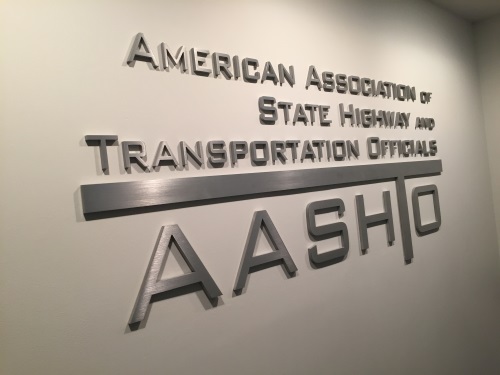The American Association of State Highway and Transportation Officials filed two comment letters on November 17 regarding two “Buy America” waiver proposals issued by the U.S. Department of Transportation.
[Above photo by AASHTO]
While AASHTO expressed concern in both letters about the “rushed implementation” of these new requirements, the organization stressed that it “greatly appreciates” USDOT’s proposed solutions to address some of concerns with new “Buy America” rules, as the waivers could help alleviate “needless” project delivery delays.

The first comment letter expressed support for the USDOT’s “Proposed Waiver for a Narrow Category of Contracts and Solicitations,” noting that this particular proposed waiver addresses “many concerns” about the applicability of the new construction materials requirements to projects that already are under construction or are in advanced stages of design and engineering.
“As noted by several state departments of transportation, it is not reasonable to apply new requirements to projects for which bids have already been solicited or contracts awarded, as well as for multi-year contracts that were in place prior to the effective date of the new requirements,” AASHTO noted.
“Doing so would likely delay implementation and could require the conduct of new procurements,” the group added. “Thus, this waiver provides needed relief for projects and procurements advertised before the new requirements went into effect.”

However, even with the currently proposed waivers, AASHTO is “still concerned” that the quick implementation of Buy America requirements for such a broad range of materials would cause delays in project delivery while states, contractors, manufacturers, and suppliers continue working to determine how best to track and verify these materials.
“Delays and costs will likely increase, at least in the short term, as contractors are forced to shift material purchases to domestic suppliers, who in turn may struggle with availability due to limited quantities and high demand,” the group emphasized. “In addition, since the Office of Management and Budget’s ‘Made in American Office’ has not yet finalized their Buy America implementation guidance, there is continued confusion regarding how to track some materials.”
The second comment letter deals with the USDOT’s proposed waiver related to “De Minimis Costs, Small Grants, and Minor Components.” AASHTO strongly supports the proposed modifications to the “Buy America” preferences as they relate to de minimis costs, small grants, and minor components, as this waiver would help ensure that transportation projects continue to move forward.

“Over 98 percent of federal transportation funding is used on projects that exceed the waiver’s proposed cost thresholds, so the expanded Buy America requirements will apply to the vast majority of federal transportation funding and, thus, will help spur American industry and job growth in the manufacturing sector,” AASHTO said in its second letter.
“This waiver will also provide relief to transportation agencies by reducing unnecessary paperwork and the tracking of small amounts of material that are either incidental to a project or that would likely have no substantive impact on the growth of jobs for American workers,” it added.
However, as implementation moves forward on those new “Buy America” rules, transportation agencies need a more “expeditious” method for obtaining approvals for project-specific exemptions in the new requirements to keep project delivery on schedule.
“Thus, it is imperative that a streamlined process for reviewing proposed waivers be established as soon as possible within USDOT as supply, availability, and sourcing will be a challenge in the near term,” the organization said.
“In addition, AASHTO strongly recommends that the new waiver thresholds be made retroactive to free up the logjam of projects caught up in delays related to the current FHWA de minimis amount of $2,500. This would apply in a minimal number of cases, but would allow projects that have been on hold for months or even years to move forward to completion,” it said.



